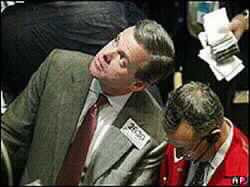Stock markets have fallen on Monday after hopes for a peaceful solution to the Iraq crisis seem to have all but disappeared. At 0855 GMT, the FTSE 100 index in London was down 71 points, or almost 2%, at 3,531. British Airways was one of the shares hardest hit in London, with a drop of 6.1% at 96-1/4 pence. Traders said a war in the Gulf was likely to dampen the demand for flights, while soaring oil prices could increase the airline's fuel costs.
Markets in the rest of Europe were also sharply lower on Monday morning.
The German Dax index of leading shares was down 2.7%, while the French market had lost almost 4%.
"We will be hostage to the headlines," said Paul Cherney, a market analyst at S&P Marketscope.
Volatility
A last-minute round of diplomacy is expected as the United Nations Security Council faces a Monday night deadline to reach consensus on a new resolution asking Iraq to disarm immediately.
But an agreement seemed unlikely as the French foreign minister, Dominique de Villepin, said on Monday France will not accept a second resolution which would authorise the use of force against Iraq.
Stock markets are facing extreme volatility due to the conflicting views of how long a war will last and the subsequent economic consequences.
All eyes will also be on the US Federal Reserve, when the bank meets to discuss interest rates on Tuesday.
World stock markets enjoyed an unexpected rally at the end of last week, all closing in positive territory.
But as the prospect of war intensifies, traders have warned that the short-term gains were as much the result of so-called "bottom fishing" - buying stocks at hammered down prices - as the start of a sustained rally.
"Iraq just means uncertainty - and uncertainty adds to volatility," said Barry Hurwitz, a trader at HSBC Securities.
Rate Decision
Amid the nervousness, the Federal Reserve will meet to consider its position on interest rates.
Another cut to levels last seen in 1958 is not out of the question, say economists.
A raft of poor economic data in the last fortnight has compounded fears that the US economy faces a long road to recovery.
Consumer sentiment hit its lowest level for over 10 years in February, while US firms axed 308,000 jobs and the country's trade deficit with other countries soared to new record levels.
While the bank is not expected to cut rates this week, economists suggested another cut in the coming two months was a distinct possibility.
"They would really like to see what happens in the first week or two before making a commitment," said Doug Lee of Economics from Washington.
But analysts at Salomon Smith Barney said they were prepared for a cut in the medium term.
"A rate-cut scenario would become highly likely...if the possible outbreak of war does not go neatly or there are signs in the next month or so that pessimism is outlasting a favourable geopolitical outcome," said SSB chief economist Robert DiClemente.
PHOTO CAPTION
Investors await a last round of diplomacy
- Author:
BBC - Section:
WORLD HEADLINES


 Home
Home Discover Islam
Discover Islam Quran Recitations
Quran Recitations Lectures
Lectures
 Fatwa
Fatwa Articles
Articles Fiqh
Fiqh E-Books
E-Books Boys & Girls
Boys & Girls  Women
Women










